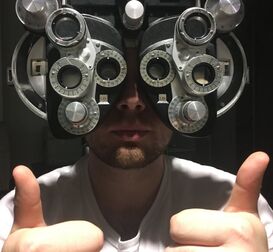Astigmatism
|
Astigmatism is a very common condition that occurs when the lenses of the eye are not the right shape to properly focus light onto the back of the eye. Astigmatism usually occurs when the front surface of the eye (the cornea) has an irregular curvature. The cornea should be smooth and equally curved in all directions (like a basketball). However, in astigmatism, the front surface of the cornea is more oval in shape (like a football). This causes light to be improperly focused onto the back surface of the eye (the retina), much like an out of focus image onto a film screen. This may result in vision that is similar to looking into a distorted and/or wavy mirror.
Astigmatism is not a disease nor does it mean that you have "bad eyes." It simply means that the front surface of the eye is not round; In fact some studies have shown that up to 90% of the population possess some amount of astigmatism. If the amount of astigmatism is low (less than 0.75 diopters) correction is not often needed. For moderate and higher amounts of astigmatism (0.75 to 6.00 diopters) correction is usually needed. The exact reason for differences in corneal shape remains unknown, but the tendency to develop astigmatism has an inherited component (it runs in the family). For that reason, some people are simply more prone to develop astigmatism than others. Symptoms of astigmatism include a distortion or blurring of images at all distances (near and far). Even with a trivial amount of astigmatism, (where vision can be fairly sharp), patients may still experience fatigue, squinting, eye discomfort, or irritation. In children: astigmatism may contribute to doing poorly in school but is often not detected during routine screenings in schools. Treatment is usually simple and can include: - Eyeglasses, which bring light back into focus properly on the retina - Contact lenses, using special lenses called "Toric" lenses - LASIK, which can reshape the front surface of the eye and eliminate astigmatism - Corneal molding, special RGP contact lenses that are worn overnight to reshape the cornea |


